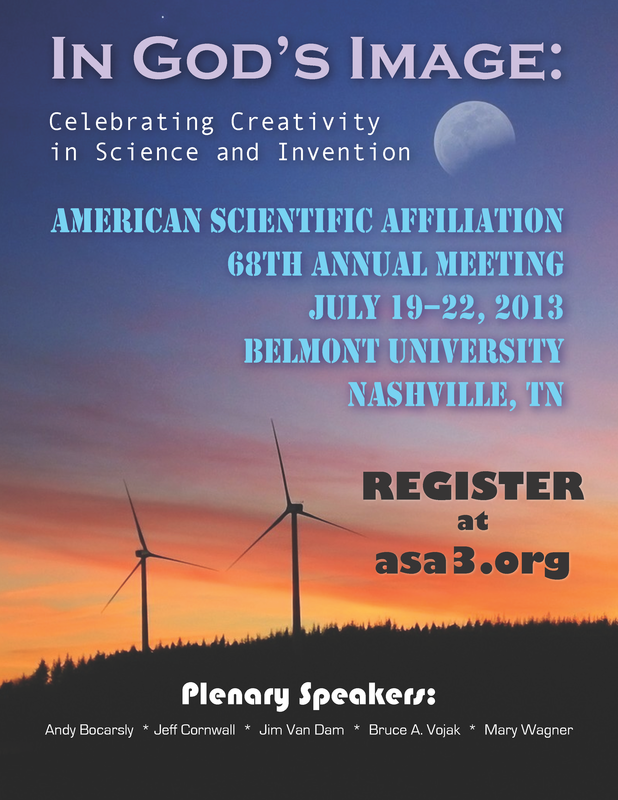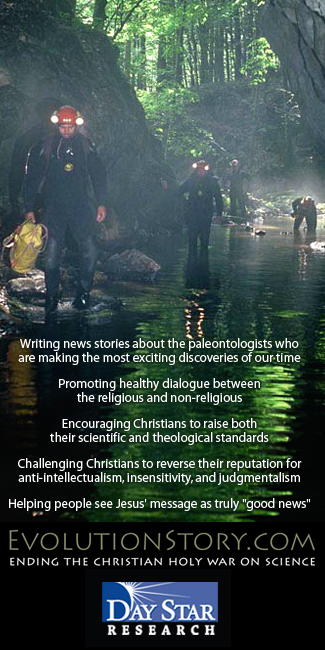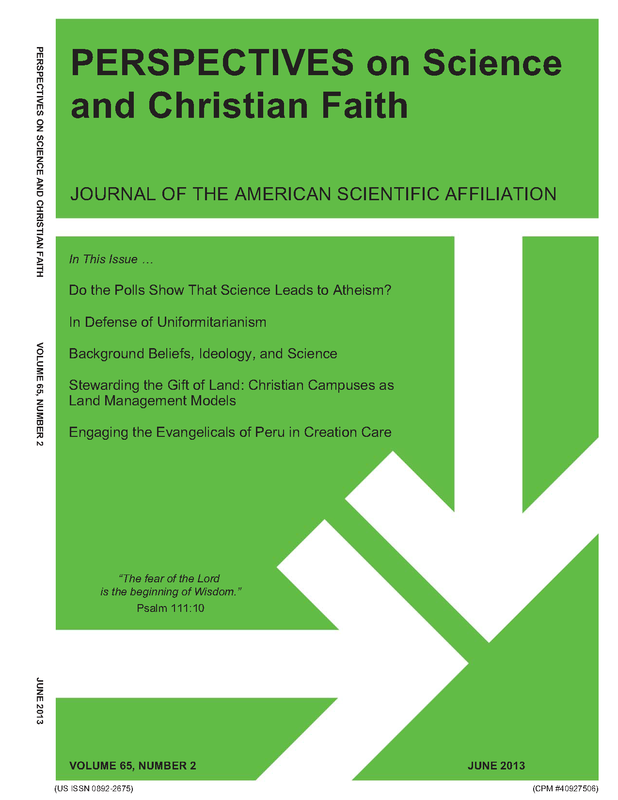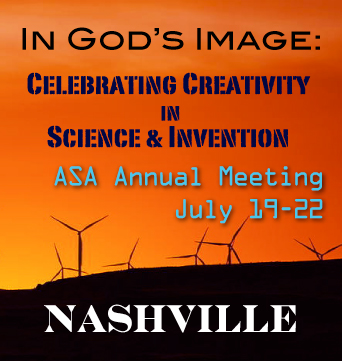Making Stuff
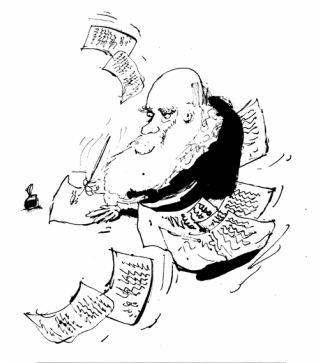 Darwin, making stuff
by Walt Hearn
"In God's Image: Celebrating Creativity in Science and Invention." That's a great theme for this summer's meeting of the American Scientific Affiliation (ASA). The Bible assures us that human beings have been created by the living God, and that we are, in a sense, earthly "copies" of our Creator. Whatever else Imago Dei might mean, it's a good bet that creativity is a feature we share with God. It's possible to carry this line of thinking too far. In Jesus' time, Augustus Caesar saw himself as a god, and later Caesars followed suit. No, we're simply "models" of the Almighty. Scientists know how to construct models of some aspect of reality to study without confusing the models with reality. In the summer of 1965, ASA and the British RSCF (Research Scientists' Christian Fellowship, precursor to Christians in Science, CiS) held a joint conference on "A Christian Philosophy of Science" in Oxford, drawing scholars from a dozen countries. Being a young scholar at the time, I gave a paper later published in the Journal of ASA (1966). Conference discussions were summed up by psychologist Malcolm Jeeves, then of the U. of Adelaide, South Australia, in The Scientific Enterprise and Christian Faith (London: Tyndale Press, 1969). I called my paper "The Meaning of Creation." It had occurred to me that scientists investigate the product of God's creation, but artists or artisans might have a better grasp of the process of creation. Having begun to dabble in writing poetry, I thought the process of making a poem might serve as a useful model of divine creation. I observed that writing poetry proceeds through two distinct phases. First, a poet meanders rather randomly through a "universe of possibilities," collecting any ideas, words, rhymes, phrases, metaphors, or patterns that might become part of a final product. The second phase is an intentional crafting of elements selected from that universe into something entirely new. It's that second phase that people usually have in mind when they speak of artistic creation. A two-phase process also modeled the scientific theory of evolution. Darwin had used "natural" instead of "intentional" in the second phase and didn't know the source of variability in the "random" phase. But he understood that "selection" had to act on something. I think that's when I first realized that "creation vs. evolution" arguments were not over two different things but over two different words for the same thing (i.e., how the created world, a.k.a. "nature," got here). A few critics complained that divine creation really did act on nothing. Yet Genesis 1 clearly pictures a sequence of events. Maybe we should use ex nihilo only for "Day 1" but ab initio for all subsequent divine creation. Christian fundamentalists easily agreed with "atheistic theologians" that evolutionary processes didn't square with the most literal reading of Genesis. Evolution was haphazard, even terribly wasteful. Biblical literalists had backed themselves into a corner. They took biblical passages to mean that all physical death "came by Adam," not just the spiritual death from which Christ offers salvation. Yet scientific evidence of billions of physical deaths (even mass deaths, i.e., extinctions) had accumulated―a lot of death long before any hominids turned up in the fossil record. Some Christians still argue that "a loving and all-knowing God would not have created the first humans by such a wasteful method." A more or less creative insight about that also came to me from art rather than from science or Scripture. A friend invited us to an art show in which she would be exhibiting some paintings and collages. The show turned out to be not a small juried exhibit but an opportunity for all students, faculty, and alumni of a community college's large art department to show off works in progress as well as finished works. In that huge show, it took Ginny and me a long time to find our friend's tiny part of it. Searching for her spot, we eyeballed hundreds of drawings, paintings, photographs, sculptures, etc.—a real "celebration of creativity." Alas, most of it would never be selected for anything. I marveled at the tremendous cost of time and materials to produce so many works of little value—but forming a background for a few really good pieces to stand out. Could it be that creative activity is inevitably so "wasteful"? I thought of all the scribblings that end up in the wastebasket on the way to a single satisfactory poem; of all the experimental failures in the lab leading up to just one or two "Aha!" moments; of all those students whose grades make up that bell-shaped curve so that a few potential scholars can crawl out from under its leading edge. Did my human model hint that even divine creation entailed great cost? Was it necessary to create millions of galaxies to bring one special planet (or a number of them) into being? Maybe fellowship with Homo sapiens was worth enough to God to put up with great losses to get to "Day 6." (Or maybe my idea is wrong, even heretical. If so, I hope it's a creative kind of heresy.) Celebrate God's creativity, by all means, but let's hear it for human creativity, too. I grew up in a solidly evangelical church and was pretty much surrounded by Christians until I enrolled in a secular university. There I was surprised to discover that so many non-Christians were extremely creative people. What was the matter with the Christian community? My theory about that began with the axiom that the God we worship is both creative and redemptive (i.e., He makes new things but He also fixes broken things). It followed that God's people should also be (in human terms) both "joyful and responsible." The church had gone wrong by majoring in the responsibility part to the neglect of the joy part. Somehow I had picked up a sense of the profound joy that comes from "making stuff." Many Christians around whom I had grown up seemed to lack that sense―or even a playful sense of humor. That made the church look to non-Christians like a bunch of legalistic kill-joys. I resolved to do what I could to change that, in the church, in science, in any other corners of my life. Nobody in my family had graduated from college and my parents knew nothing of academic life. As a young biochemistry professor I tried to explain to them what I was doing in the lab, and how excited I was to be doing it. I was having a ton of fun at it. I remember my father saying, seriously, "Fun's fun, son, but what do they pay you for?" So, some people are big on responsibility but, let's say, a little short on creativity. Especially among the avant-garde, however, we find the opposite extreme: highly creative people who enjoy what they're doing, but with little concern for others. It's true that even if the world has no particular need for what we produce―a novel interpretation, a new "composition of matter" (Patent Office phrase for "stuff"), a unique organization, an original concept, a work of art, even a "Beyond Science" column―we will still get a lot of satisfaction out of bringing it into existence. For what the world does need, Christians should also be "taking care of the Lord's business." Even a heavy responsibility (like ending war, protecting the environment, raising a family) can be taken up with a joyful spirit. We can use our creativity to meet the needs of others, guided by the Holy Spirit and being careful to "do no harm" in the process. I'm glad that invention is included in ASA's meeting theme as well as science. Some scientific innovations can be patented, but patentability requires both novelty and usefulness, plus "inventive ingenuity" in "reducing to practice." Making stuff to be used ought to be as much fun as making something new just because it's never been done before. God is both our Creator and Redeemer. As a radio operator might say, Copy that! |



